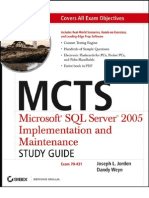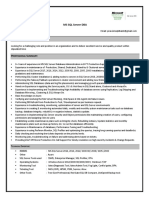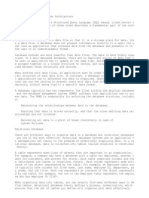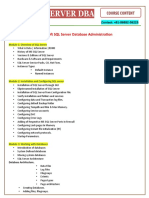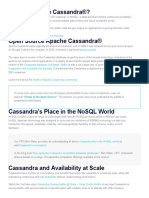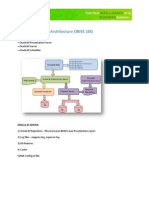Troubleshooting SQL
Uploaded by
divandanTroubleshooting SQL
Uploaded by
divandanTroubleshooting SQL Server 2005/2008 Query Performance/Scalability Issues
This flowchart is meant to address at a high level the most common issues that can affect performance and scalability in SQL Server 2005/
2008 implementations. This is an iterative process and should be performed only in a test environment.
Work left to
right, top to 1. READ 2. CAPTURE 3. EVALUATE 4. RESOLVE
bottom
Search: www.microsoft.com/ Tool:
TechNet for: SQL Management Studio
Troubleshooting Update Statistics
Auto Create and YES
Performance Problems
Update Statistics
in SQL Server 2005 Statistics Enabled?
Have Auto Create and Update Run the sp_updatestats procedure
Statistics been disabled, to update all the statistics in the
indicating that the statistics database
Use the SSMS Database Options might be out of date?
feature to determine if Auto
Create and Update Statistics
are enabled
Search: support.microsoft.com
for ID 224587
Troubleshooting NO Perform Index
Application and Query
Performance Analysis
Tool:
SQL Profiler
YES Remove any join or index hints
Evaluate in SSMS that may no longer be valid
Table/Index Scans?
Slow-Running Evaluate the validity of the search
arguments
Queries
Ensure there are no columns
Copy each of the slow-running inside expressions or functions in
queries into a query window and Are there tables or index scans
Search: support.microsoft.com that could consume large a predicate that would disallow an
for ID 243589 evaluate the execution plan
OPTIMAL EXECUTION PLANS
amounts of IO? index seek
Use the SQL Profiler
TSQL_Duration Template to Use the INCLUDE clause in an
Troubleshooting Slow- determine the long-running index to minimize key lookups
running Queries queries with the longest
duration and consuming the NO Evaluate the query in the Database
most IO Tuning Advisor
Query Too Complex?
Tool:
SQL Profiler
Search: SQL Server Books On
Line
Are there too many joins, temp YES Rewrite Query
tables, sub-queries and/or
Database Tuning control of low language to allow
Advisor High CPU Usage for optimal execution plans?
Try forcing a different plan with a
join or index hint
NO
Try breaking the query into
Use the SQL Server Standard smaller parts
template to determine queries
consuming the most CPU
Faster in SSMS?
YES Examine App for Modify
Result Handling Application Code
Does the query run faster in the
SSMS query window than in
from the application?
Ensure that the application is Ensure that only the results that
returning all of the results as soon are needed are being requested,
as possible to the client and that all results are consumed
as soon as possible
NO
Cannot Get an
More In-Depth
Optimal Plan? YES
Analysis
Statistics are up-to-date, all of
the above steps have been
followed, and it seems that the
Search on support.mcirosoft.com
optimizer has not selected an
and msdn.microsoft.com for more
optimal plan?
in-depth query tuning resources
Perform Index
Evaluate in SSMS Hash Joins, Sorts, YES and Query
and/or Filters? Analysis
Are there hash joins, sorts, and/ Determine indexes that will best
Copy each of the problematic
or filters displayed in the support this query, using the SSMS
queries into a SSMS query window
execution plan? query plan or the Database Tuning
and evaluate the query
Advisor.
Tool:
Search: support.microsoft.com
SQL Server Profiler
for ID 271509
How to Monitor SQL
Server Blocking
Blocking Examine
Blocking? YES Open Transactions? YES Transaction
Handling Logic
Is the blocking script showing Are there currently open Ensure that the transactions are all
BLOCKING
Use the sp_blocker_pss80 transactions (can be captured
that there are blocks occuring? committed and rolled back
procedure outlined in article using DBCC OpenTran()) correctly within the application
271509 to determine if there is
code, or within the stored
blocking
procedures
Search: support.microsoft.com
for ID 169960
Analyzing and
Avoiding Deadlocks in
SQL Server Tool:
SQL Server Profiler
Evaluate SQL Server
Examine
Deadlock Tracing Deadlocks?
YES Deadlock Trace
Transaction
Information Handling Logic
Search: support.microsoft.com
for ID 832524 The trace and/or error logs will Ensure that resources are being
Use the trace flags outline in Are there deadlocks occuring in identify which spids are involved
the system? acquired in the same order and
How to Resolve a article 832524 or use the in the deadlocks and the command held for the shortest possible time
Profiler Deadlock Events in a will be in the input buffer
Deadlock Ensure that user input is not being
Profiler trace to log deadlock requested in the middle of a
information transaction
ADVANCED TOOLS EXECUTION PLAN REUSE
Tool:
Search: www.microsoft.com/ SQL Server Profiler
technet for:
Batch Compilation, Ad hoc or Dynamic
Recompilation, and Queries? YES Rewrite Queries
Plan Caching Recompilations
Are the queries built
Try using prepared statements,
dynamically or on an ad hoc
stored procedures, or
basis?
sp_executesql to reduce
compilations
Use the Profiler trace outlined in
the article to identify
recompilation issues NO
Recompliations?
YES Rewrite Queries
Are there excessive Try using prepared statements,
recompilations? stored procedures, or
sp_executesql to reduce
compilations
Try changing the database
PARAMETERIZATION property
between forced and simple
Search: www.microsoft.com/
downloads for: Search: www.microsoft.com/
Search: www.codeplex.com downloads for:
for:
SQL Server 2005
RML Utilities for SQL
Performance DMVStats 1.01
Server
Dashboard
Search: SQL Server Books On
Line for:
SQL Server 2008
Management Data
Warehouse
You might also like
- Apache Cassandra Administrator Associate - Exam Practice TestsFrom EverandApache Cassandra Administrator Associate - Exam Practice TestsNo ratings yet
- Migrate From Oracle To Postgresql With Azure: Webinar SeriesNo ratings yetMigrate From Oracle To Postgresql With Azure: Webinar Series21 pages
- Sybex - Mcts.microsoft - sql.Server.2005.Implementation - And.maintenance - Study.guide - Exam.70 431.jul.2100% (1)Sybex - Mcts.microsoft - sql.Server.2005.Implementation - And.maintenance - Study.guide - Exam.70 431.jul.2679 pages
- DB2 9 Fundamentals Exam 730 Prep, Part 6:: Data ConcurrencyNo ratings yetDB2 9 Fundamentals Exam 730 Prep, Part 6:: Data Concurrency29 pages
- Talend Open Studio For Data Integration: User GuideNo ratings yetTalend Open Studio For Data Integration: User Guide452 pages
- An Introduction To SQL Server ClusteringNo ratings yetAn Introduction To SQL Server Clustering10 pages
- Create Int Varchar Date Varchar State Varchar: Emp - Piyush Employeeid Empname 30 Dob City 20 20100% (1)Create Int Varchar Date Varchar State Varchar: Emp - Piyush Employeeid Empname 30 Dob City 20 2010 pages
- Whitepaper - SQL Server Database Backup and Restore PlanningNo ratings yetWhitepaper - SQL Server Database Backup and Restore Planning14 pages
- Introduction To PL/SQL: Stone Apple Solutions Pte LTDNo ratings yetIntroduction To PL/SQL: Stone Apple Solutions Pte LTD109 pages
- ADBMS Parallel and Distributed DatabasesNo ratings yetADBMS Parallel and Distributed Databases98 pages
- Microsoft SQL Server Database AdministrationNo ratings yetMicrosoft SQL Server Database Administration6 pages
- My Power BI Report Is Slow - What Should I DoNo ratings yetMy Power BI Report Is Slow - What Should I Do26 pages
- Oracle SQL and PLSQL Interview Questions and AnswersNo ratings yetOracle SQL and PLSQL Interview Questions and Answers21 pages
- Devops Engineer (5-10 Years' Experience) : Job ProfileNo ratings yetDevops Engineer (5-10 Years' Experience) : Job Profile3 pages
- SS1123 - D2T - Apache Cassandra Overview PDF100% (1)SS1123 - D2T - Apache Cassandra Overview PDF45 pages
- Microsoft SQL Server DBA Self Learning: Sample Copy Dba Topics FundamentalsNo ratings yetMicrosoft SQL Server DBA Self Learning: Sample Copy Dba Topics Fundamentals2 pages
- SQL Performance Explained Markus Wignandki PDFNo ratings yetSQL Performance Explained Markus Wignandki PDF62 pages
- Forecasting MySQL Performance and Scalability100% (1)Forecasting MySQL Performance and Scalability41 pages
- SQL Server 2008/2012: Database Administrator Class 1No ratings yetSQL Server 2008/2012: Database Administrator Class 169 pages
- Technology Integration Lesson Plan Template-2-3No ratings yetTechnology Integration Lesson Plan Template-2-33 pages
- Add Apps To Microsoft Intune - Microsoft LearnNo ratings yetAdd Apps To Microsoft Intune - Microsoft Learn12 pages
- 300+ TOP JIRA Interview Questions and Answers 2023No ratings yet300+ TOP JIRA Interview Questions and Answers 202314 pages
- Assignment Introduction To Computer Application in BUMA AssignmentNo ratings yetAssignment Introduction To Computer Application in BUMA Assignment2 pages
- Youtube PavanKumar Manual Testing 01 (Theory)No ratings yetYoutube PavanKumar Manual Testing 01 (Theory)70 pages
- Revit LT: Revit LT Make The Move To 3D BIMNo ratings yetRevit LT: Revit LT Make The Move To 3D BIM1 page
- SQL and Mysql Difference - Google SearchNo ratings yetSQL and Mysql Difference - Google Search2 pages
- 5 Free Alternatives To Microsoft Word - TechrepublicNo ratings yet5 Free Alternatives To Microsoft Word - Techrepublic26 pages
- Android Application To Display Hello World Activity - Helloworld - XMLNo ratings yetAndroid Application To Display Hello World Activity - Helloworld - XML46 pages
- WindowsFormsApplication1 Csproj FileListAbsoluteNo ratings yetWindowsFormsApplication1 Csproj FileListAbsolute2 pages
- Lecture Notes Day 2 Demo 18 Oracle Multi-Tenant Database Architecture - Create A New Pluggable Database Named GsisNo ratings yetLecture Notes Day 2 Demo 18 Oracle Multi-Tenant Database Architecture - Create A New Pluggable Database Named Gsis6 pages
- RichTrees Company & TRIS Iarb Profile 15 June 2022No ratings yetRichTrees Company & TRIS Iarb Profile 15 June 202215 pages


